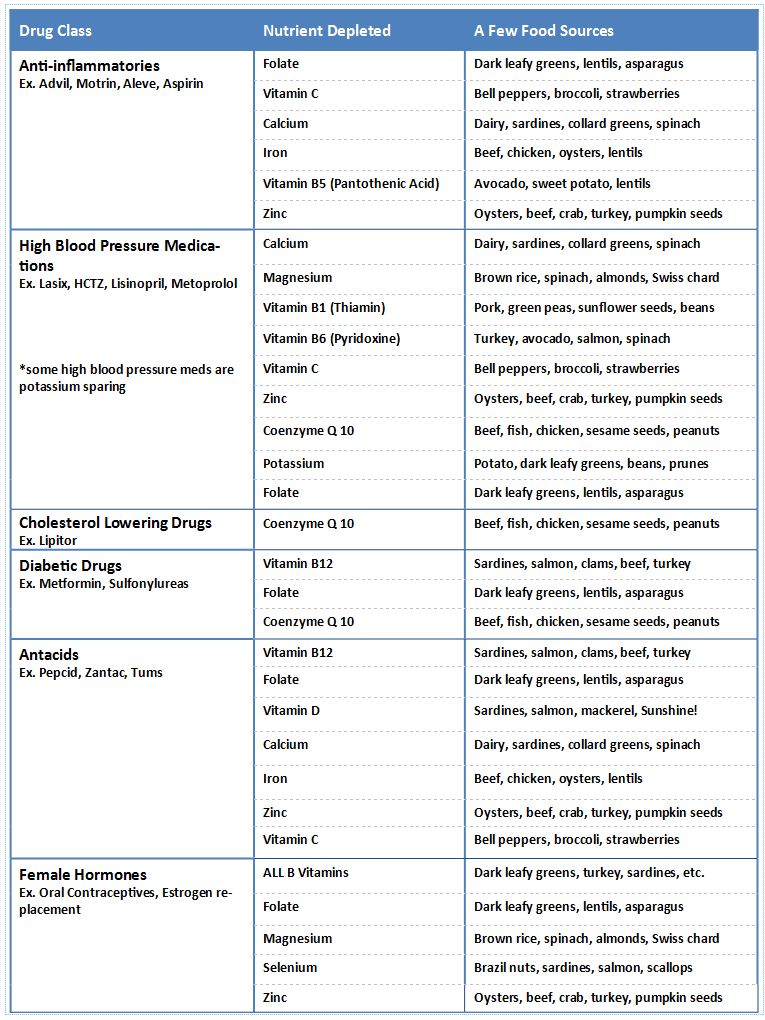

Did you know that almost 70 percent of Americans take at least one prescription medication? More than half take at least two, according to a new study by researchers at the Mayo Clinic. And according to the CDC, the average American is on six different medications by the age of 65. Many of these medications are not only lifesaving, but they can help improve symptoms, ease pain and have many other positive benefits. However, they are not without side effects that may have a profound effect on our health, and more specifically, our nutrition status.
Many of us may gloss over the list of side effects from over the counter or prescription medications and may not realize that the side effects may cause depletion or even a deficiency of necessary nutrients. Poor diet alone can lead to nutrient deficiencies, add to that multiple medications and the results can be devastating. It might surface as a weakened immune system, anemia, fatigue, depression, osteoporosis, skin issues, even GI issues like gas and bloating.
Below is a list of commonly used medications grouped by use, the nutrients that are depleted and where you can find those nutrients in food.
I have made some generalities below for simplicity; each specific medication can have a different impact.
Know your medications!
Medications are a necessary component of many of our lives. However there are sometimes drawbacks. Here are some tips to follow to help ensure optimal health:
- Always read the package insert that comes with your medications (prescription or over the counter) to understand any side effects.
- Always follow your provider’s instructions on when to take medications.
- Eat a nutrient dense diet.
- Ask your Registered Dietitian/Nutritionist or Provider before starting supplements. All supplements are not created equal. You want to make sure you are taking a good quality supplement with the appropriate form and dose of certain nutrients.
If you have questions about your specific medications and the impact they may be having on your nutritional status ask your provider or a Registered Dietitian.
Lentil Soup with Swiss Chard and Turkey Sausage
Adapted from: Deliciously Organic
Serves 5
This is one nutrient packed dish! The lentils, turkey and Swiss chard are great sources of folate, magnesium, calcium, potassium, zinc, iron, B5, B6, B12 and many other nutrients. This is one of those dishes that is even better the next day, plus it’s really easy!
Ingredients
- 1 Tablespoon olive oil
- 1 small yellow onion, chopped
- 2 carrots, chopped
- 2 stalks celery, chopped
- 1 teaspoons sea salt
- 2 Tablespoons tomato paste
- 1 cup dry lentils
- 1 cup crushed tomatoes (I used Muir Glen Fire Roasted)
- 3 cups low sodium chicken stock
- 1 pound turkey sausage, cut into 1/4-inch thick coins (I used a turkey kielbasa)
- 1-2 bunches of Swiss chard
- Freshly ground black pepper
Instructions
- Heat olive oil in a large pot over medium heat.
- Stir in onion, carrots and celery. Let cook about 10 minutes, stirring occasionally until onion is translucent.
- Add sausage and cook 10 more minutes until slightly browned.
- Increase heat to medium and stir in tomato paste and sea salt.
- Add lentils, tomatoes and stock.
- Increase heat to medium-high and bring to a boil, cook about 10 minutes or until all veggies are tender.
- Stir in chard and cook 2-3 minutes more.
- Season with ground black pepper and adjust sea salt to taste. Serve.
Nutrition Information per Serving: 370 calories, 13 g Fat, 3g Saturated Fat, 65mg Cholesterol, 1180mg Sodium, 34g Carbohydrates, 8g Fiber, 30g Protein
Click here for a printer-friendly version of this recipe.
Click here for a printer-friendly version of this blog post.





